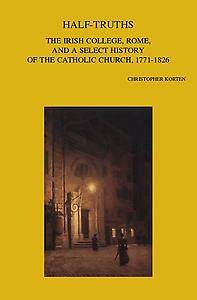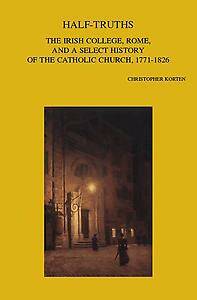
- Afhalen na 1 uur in een winkel met voorraad
- Gratis thuislevering in België vanaf € 30
- Ruim aanbod met 7 miljoen producten
- Afhalen na 1 uur in een winkel met voorraad
- Gratis thuislevering in België vanaf € 30
- Ruim aanbod met 7 miljoen producten
Zoeken
Half-Truths
The Irish College, Rome, and a Select History of the Catholic Church, 1771-1826
C Korten
€ 98,00
+ 196 punten
Omschrijving
The history of the Irish College in Rome between 1771 and 1826 offers an insider's view of more than just the College itself; it sheds important light on the effects of the suppression of the Jesuits in 1773 and the suppression of the Church more generally during the French period (1796-1814). Using the Irish College as a prism, this work reveals how troubling, how long, and how deep-rooted the effects of these fateful events were on the Church. For a half-century, the College felt the theological, financial, and administrative anomalies which followed Dominus ac Redemptor, the papal bull of suppression. The men at the centre of the Jesuit plot were also those who took up roles at institutions like the Irish College, following the order's demise. What is less understood is that the efforts to topple these men and their agendas produced another wave of deleterious effects during the pontificates of Pius VI (r. 1775-1799) and Pius VII (r. 1800-1821). Thus, the lies, or half-truths, which were necessary to effect the Jesuit suppression, were adopted by subsequent administrations, initially to further this agenda under Clement XVI (r. 1769-1774) and later to overturn it, producing a weak Church and ineffective member institutions, such as the Irish College.
Specificaties
Betrokkenen
- Auteur(s):
- Uitgeverij:
Inhoud
- Aantal bladzijden:
- 341
- Taal:
- Engels
- Reeks:
- Reeksnummer:
- nr. 322
Eigenschappen
- Productcode (EAN):
- 9789042945227
- Verschijningsdatum:
- 13/04/2021
- Uitvoering:
- Paperback
- Formaat:
- Trade paperback (VS)
- Afmetingen:
- 160 mm x 240 mm
- Gewicht:
- 449 g

Alleen bij Standaard Boekhandel
+ 196 punten op je klantenkaart van Standaard Boekhandel
Beoordelingen
We publiceren alleen reviews die voldoen aan de voorwaarden voor reviews. Bekijk onze voorwaarden voor reviews.











